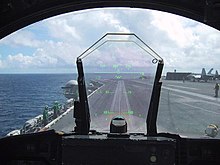
A head-up display, or heads-up display,[1] also known as a HUD (/hʌd/) or head-up guidance system (HGS), is any transparent display that presents data without requiring users to look away from their usual viewpoints. The origin of the name stems from a pilot being able to view information with the head positioned "up" and looking forward, instead of angled down looking at lower instruments. A HUD also has the advantage that the pilot's eyes do not need to refocus to view the outside after looking at the optically nearer instruments.
Although they were initially developed for military aviation, HUDs are now used in commercial aircraft, automobiles, and other (mostly professional) applications.
Head-up displays were a precursor technology to augmented reality (AR), incorporating a subset of the features needed for the full AR experience, but lacking the necessary registration and tracking between the virtual content and the user's real-world environment.[2]
- ^ Oxford Dictionary of English, Angus Stevenson, Oxford University Press – 2010, page 809 (head-up display (N.Amer. also heads-up display))
- ^ "Augmented reality brings VR to the real world in all sorts of exciting ways". Digital Trends. 2019-06-06. Retrieved 2022-10-10.